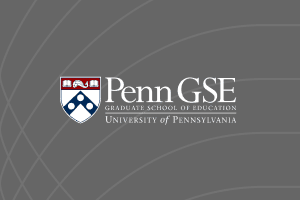Biography
Dr. Aikins joined the faculty of Penn GSE in Fall 2013. He received his Ph.D. in Higher Education and Organizational Change from the University of California, Los Angeles in 2011, and specializes in collegiate substance abuse and student health research. Dr. Aikins has teaching, administrative, and research experience in K-12 and postsecondary settings, including the University of Southern California, Carnegie Mellon University, UCLA, and Occidental College.
Prior to joining Penn GSE, Dr. Aikins received a Ruth L. Kirschstein National Institute of Health (NIH) Postdoctoral Fellowship at the National Development and Research Institutes (NDRI) in New York City, and lectured at CUNY Brooklyn College.
In his current role, Dr. Aikins advises over 60 full- and part-time master’s students in the Higher Education Division, and oversees the Penn GSE Graduate Assistantship Program for full-time M.S.Ed. students. Additionally, Dr. Aikins teaches graduate classes, supports admissions functions of the Higher Education Ph.D., Ed.D., and M.S.Ed. programs, and manages the Higher Education Division.
Education
- Ph.D. (Higher Education and Organizational Change) UCLA, 2011
- M.A. (Higher Education and Organizational Change) UCLA, 2005
- B.A. (English and Comparative Literary Studies; Education Minor) Occidental College, 2003
Areas of Expertise
- College student health
- Alcohol and other drug use
- Mental health
- Admissions and college access
- Artificial intelligence in higher education
Academic Programs
Higher Education, M.S.Ed.Research Interests and Current Projects
Dr. Aikins’s primary research interests concern college student health and wellness, including mental health, substance abuse issues, sexual health and safety, institutional responses to COVID-19, and most recently, student use of artificial intelligence (AI) tools in postsecondary settings.
His current research explores academic use cases and evolving ethical perceptions around ChatGPT and other AI platforms among college students. Previously, Dr. Aikins analyzed institutional policy responses to COVID-19 that promote campus health outcomes, resulting in a collaboration with the University of Toronto to comparatively analyze crisis communications of Chinese, Canadian, and U.S. postsecondary institutions during the outbreak of COVID-19.
His doctoral research qualitatively explored the health and developmental implications of college students who use stimulant medications medically and non-medically (e.g., Adderall, Ritalin, and other so-called “cognitive enhancement drugs”), which earned the Margaret J. Barr Research Award from the U.S. Department of Education’s Office of Safe and Drug-Free Schools.
In his role as an NIH Research Fellow, Dr. Aikins served as Primary Investigator of a large multi-regional survey of prescription drug diversion, investigated the ethics and social equity of enhancement-drug use in academia, and published on the mental health and substance use characteristics of student veterans of color.
Outside of his primary teaching and administrative responsibilities to the Higher Education Division, Dr. Aikins has presented over 20 selected or invited talks at organizations including The American Educational Research Association (AERA), The American College Health Association (ACHA), The Association for the Study of Higher Education (ASHE), TED, and NerdNite.

